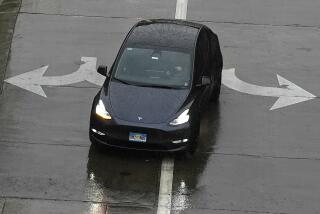Jitters Push Auto Sales Down 7%
Consumer jitters about a weak economy, combined with a deadly blizzard in the East and concerns about a possible war in Iraq, led to a 7% drop in February auto sales compared with those a year ago.
A few foreign automakers with hot new products managed to buck the trend, but sales overall dipped to a seasonally adjusted annual rate of 15.5 million units. Analysts say, however, that the February figures should not affect overall estimates of 16.5 million sales for the full year, down from 16.8 million in 2002.
“It’s the war talk and the economy. We’re feeling a little of both,” said Les Saul, general manager at Classic Chevrolet in Anaheim Hills. Sales at his dealership fell about 10% in February, he said.
General Motors Corp., the world’s largest automaker, took the biggest hit in February as its sales plunged 19%. GM said Monday that it planned to cut second-quarter production 10%.
After the September 2001 terrorist attacks, GM launched low-interest loans and other sales incentives to lure buyers. Its Big Three rivals Ford Motor Co. and DaimlerChrysler’s Chrysler Group have followed suit, as have a few import brands.
“I think they’ve gone to the well pretty deeply,” said Paul Wondries, Alhambra-based partner in a chain of 20 new-car dealerships -- domestic and import -- in California and Nevada. Wondries said that none of his dealerships, including the GM brands, had a terrible February but that none was stellar, either.
“We’re finding that our salespeople are having to spend a lot more time building relationships with prospective customers instead of just dealing on price,” he said.
Ford, easing off a sales slump in 2002, saw its sales remain flat in February, and DaimlerChrysler posted a 4% dip from combined sales of its American and German models. Mercedes-Benz’s sales gained 8% for the month but could not make up for the 14% decline at Chrysler Group, the maker of Chrysler, Dodge and Jeep vehicles.
Meanwhile, BMW of Germany and Honda Motor Co. of Japan, which offer few incentives, posted double-digit sales increases last month.
The typical import brand spent about $900 per vehicle in incentives last month; GM spent about $3,000, and the other domestic manufacturers were close behind, said David Healy, auto industry analyst for Burnham Securities Inc.
BMW’s estimated sales -- the company doesn’t file its final numbers until today -- were up 16% in February, and Honda’s sales climbed 14% last month.
Their success in an otherwise dim month underscores the importance of having a good product, analysts said.
BMW posted its gains largely on the strength of the hot new Mini brand, which was introduced last March, and Honda’s sales gains came largely from the new Pilot sport utility vehicle and the Element, a truck-like crossover vehicle priced from about $17,000 to appeal to younger or thriftier buyers.
“There are three reasons” for strong sales by Honda and BMW, Healy said. “Product, product and product.”
Toyota Motor Corp., the biggest Japanese automaker, saw its fortunes dip in February as its U.S. sales fell 1%, partly because of slumping sales of its mainstream Camry sedan.
And Nissan Motor Co. posted a 12% decline last month as customers delayed purchases while waiting for the arrival later this year of a new Maxima sedan and Quest minivan.
Analysts said that soaring gasoline prices also may have had a small effect on sales, especially in light trucks, but that it probably would take several months of sustained $2-a-gallon gas prices to make a difference.
“We think that consumers have already made all the spending adjustments they are going to make for the year, especially adjustments because of a possible war in Iraq,” said Rebecca A. Lindland, senior auto industry analyst for Global Insight.






